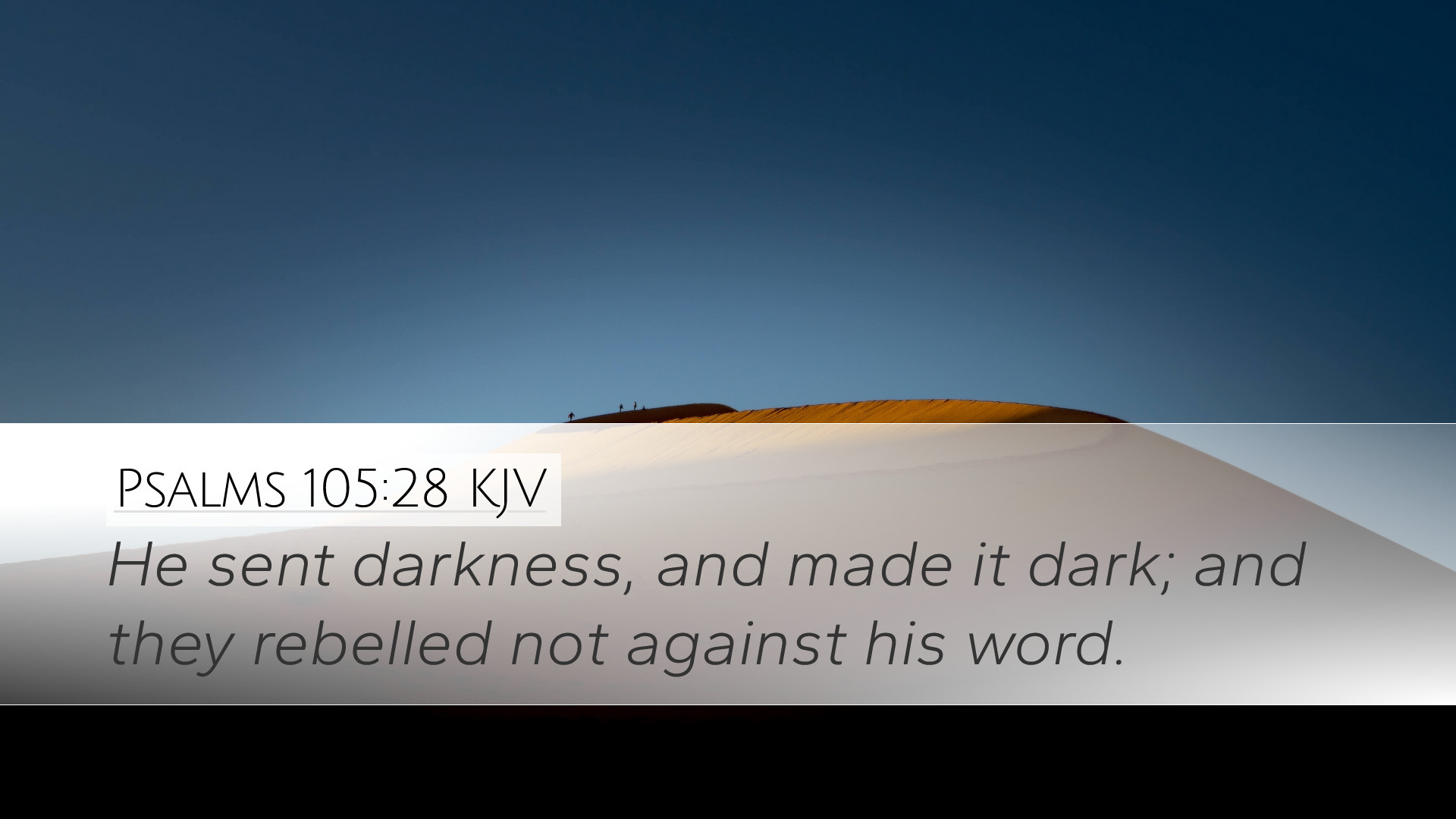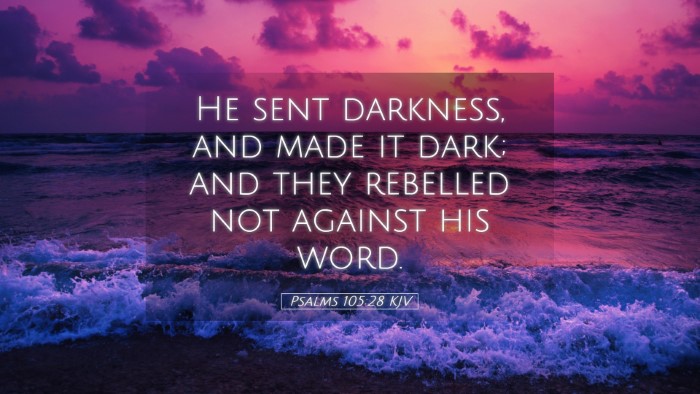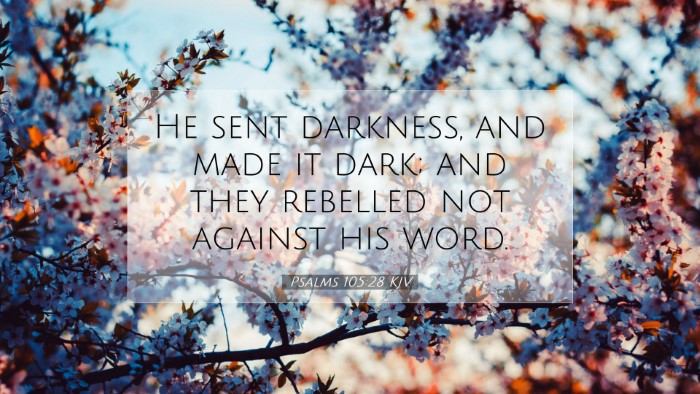Commentary on Psalms 105:28
Verse Text: “He sent darkness, and made it dark; and they rebelled not against his word.”
Introduction
This verse is part of a larger narrative in Psalm 105, which focuses on the historical acts of God toward Israel and His deliverance of them as a chosen people. In this specific verse, the psalmist highlights the events surrounding the plagues of Egypt, particularly the ninth plague of darkness as depicted in Exodus 10:21-29. This commentary synthesizes insights from notable public domain commentaries to elucidate the profound meaning of this verse.
Contextual Overview
The psalmist recounts the miraculous signs God performed to liberate the Israelites from slavery. Psalms 105 serves as a reminder of God’s faithfulness and sovereignty throughout Israel’s history. The specific mention of darkness emphasizes God's direct intervention in the natural world to demonstrate His power over Pharaoh and the Egyptian gods.
Insights from Matthew Henry
Matthew Henry expounds on the significance of God's actions as a demonstration of His supreme authority. He notes that the “sending of darkness” was a precise act of divine judgment, illustrating God’s capability to control even the elemental forces. This act is also a testament to His mercy as it provided a clear distinction between the people of Egypt and the Israelites (Exodus 10:23).
Henry emphasizes that despite the hardship faced by the Egyptians as a result of God’s command, the Israelites remained faithful. This resilience is seen as a crucial aspect of their identity as a covenant people. The phrase “and they rebelled not against his word” suggests a steadfast adherence to God's directives amidst chaos.
Insights from Albert Barnes
Albert Barnes offers a thorough theological reflection on the nature of God's governance over creation. He indicates that the darkness is representative not only of the literal absence of light but also symbolizes spiritual blindness and judgment upon the people who rejected God. Barnes argues that God’s ability to send darkness reflects His omnipotence and serves as a contrast to the illumination He offers His followers.
Moreover, he highlights that the obedience of the Israelites amid the plagues further indicates their recognition of God’s power and authority. They serve as a model for believers today, who are called to trust in God’s providence, especially in times of distress.
Insights from Adam Clarke
Adam Clarke's commentary provides a nuanced look at the symbolic implications of darkness as used in this context. He connects the darkness experienced in Egypt with biblical themes of judgment and the moral condition of the Egyptian society. Clarke points out that this darkness was so thick that it could be felt, suggesting a profound disconnection from the light of God’s favor.
Clarke discusses the implications of the phrase “and they rebelled not against his word,” asserting that it reflects the profound acknowledgment of God’s supremacy by the chosen people. Their submission amidst trials speaks volumes about their faithfulness, contrasting with the defiance exhibited by Pharaoh and the Egyptians. The verse serves as a reminder of the God-given strength available to believers to resist temptation and remain steadfast in faith.
Theological Implications
The theological implications of Psalms 105:28 are multi-faceted. This verse highlights God's omnipotence, portraying Him as the sovereign ruler over all creation. His ability to command darkness serves as a reminder of His control over both natural and supernatural realms. For pastors and theologians, this verse invites reflection on God’s nature as one who can bring forth judgment but also clarity and hope to His faithful followers.
- The Sovereignty of God: The verse serves to illustrate the unyielding power of God against human obstinance.
- The Nature of Faithfulness: The passage extols the virtue of adhering to God's word, especially in trying times.
- Contrast Between Light and Darkness: The theme reflects the moral implications of spiritual enlightenment versus ignorance.
Application for Believers
For modern believers, Psalms 105:28 encourages a robust understanding of divine intervention in human history and the importance of remaining faithful amid life’s challenges. The acknowledgment that the Israelites did not rebel against God’s word serves as a call to contemporary Christians to cultivate a posture of obedience and trust in God's guidance.
This text challenges believers to reflect on their responses to trials. Are they adhering to the truth of God's word, or are they swayed by the darkness surrounding them? This verse encourages persistence in faith, trusting that God still commands authority over darkness in today’s world.
Conclusion
Psalms 105:28 is rich in theological depth and practical application. Insights from Matthew Henry, Albert Barnes, and Adam Clarke facilitate a comprehensive understanding of the verse, reminding us of God’s sovereignty, the importance of obedience, and the contrast between spiritual light and darkness. As ministers, students, and scholars reflect upon this scripture, it serves as both a historical account of God’s actions and a pertinent lesson for contemporary faith practice.


